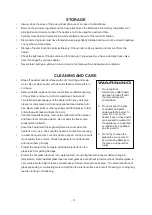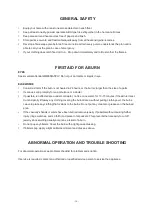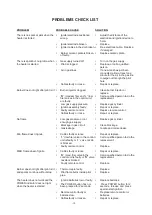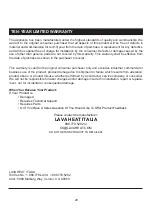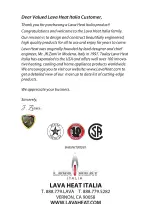
STORAGE
%
Always close the valve of the gas cylinder after use or in case of a disturbance.
%
Remove the pressure regulator and the hose attachment, the batteries in the battery compartment of
pilot ignition and remote control if the heater is not to be used for a period of time.
%
Cylinder must be stored outdoors in a well-ventilated area out of the reach of children.
%
Disconnected cylinder must have threaded valve plugs tightly installed and must not be stored in garage
or any other enclosed area.
%
Storage of heater indoors is permissible only if the cylinder is disconnected and removed from the
heater.
%
Check the tightness of the gas valve and for damage. If you suspect you have a damaged gas valve,
have it changed by your gas dealer.
%
Never store liquid gas cylinder in a sub-terrain, or at places without adequate air ventilation.
CLEANING AND CARE
%
Wipe off powder coated surfaces with soft, moist rag and soap
water. Do not clean heater with cleaners that are combustible or
corrosive.
%
Remove debris, spider and insect nests from ventilation opening
of the cylinder enclosure, control compartment, burner and
circulation air passageways of the heater with heavy-duty pipe
cleaner or compressed air to keep appliance clean and safe for
use. Never clear ports or other openings with toothpicks or other
article that will break and block the ports.
WARNING
1. Do not perform
maintenance after heater
has been turned off until
the temperature has
cooled down.
2. Do not expose the pilot,
controllers and parts
underneath the burner to
%
If carbon deposits develop, remove the reflector and flue screen
and clean them with soap water. Do not paint the flue screen,
windshield or reflector.
%
Cover the heater with the supplied protective cover when the
heater is not in use. Wait until the heater is cool before covering.
%
In a salt-air environment, such as near an ocean, corrosion occurs
more quickly than normal. Check frequently for corroded areas
and repair them promptly.
%
Protect the heater from bumps to avoid delicate parts like the
glass tube from getting damage.
water. Do not use the
heater if any of these parts
are exposed to water until
the appliance is inspected
or repaired by a qualified
service person.
3. Do not try to clean the
glass tube in any way to
avoid causing damage to
the glass, and personal
injury.
%
Protect the hot glass tube from rain, water splash, or anything that will cause a sudden change in
temperature. Heat resistant glass tube like most glasses, except heat & thermal shock resistant glass, is
very vulnerable to rapid increases or decreases of temperature across its area. The external surface of
glass expanding or contracting more rapidly than the interior surface as a result of heating or cooling may
lead to cracking or shattering.
- 15 -















